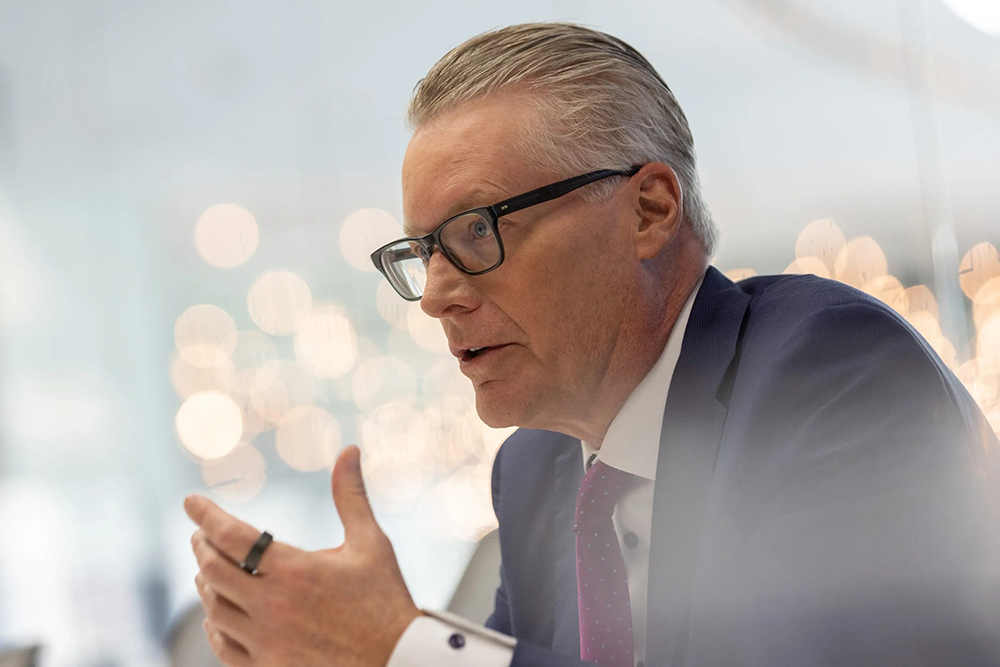
25岁那年,现任达美航空公司(Delta Air Lines)CEO埃德·巴斯蒂安才第一次坐上飞机。在多年以后的今天,他已成为《财富》世界500强企业中最受人爱戴的CEO之一。
巴斯蒂安在达美航空工作已经超过25年时间,可谓见多识广。无论是9·11事件对航空业的重创,还是2005年多家航空公司宣告破产,数千名员工遭到裁员,又或是后来让航空业工作岗位减少约43%的新冠疫情,他都有亲身经历。
但达美航空不仅成功走出了困境,还逐渐成为全球最赚钱的航空公司。作为《财富》全球最受赞赏公司,达美航空之所以能取得如此成功,巴斯蒂安功不可没。他还被《首席执行官》(Chief Executive)杂志评为2023年度最佳CEO。
在“西南偏南”(South by Southwest)年度系列科技、音乐和电影盛会上,巴斯蒂安登台亮相,与《财富》杂志主编尚艾俪进行了一场精彩对话,讲述了自己带领公司走向成功的秘诀。
1.以人为本
2005年,随着西北航空(Northwest Airlines)、全美航空( US Airways)和美联航(United Airlines)等大型航空公司纷纷申请破产,达美航空也未能幸免,同样走上了破产之路。
破产后,公司采取了降薪措施,并裁撤了至少7000名员工,但也建立起了“以员工为中心”的全新企业文化,这首先体现在发放管理层薪酬前优先发放员工工资上。巴斯蒂安说,现在,员工工资占“公司利润的15%,并且先于管理层发放”。
达美航空于2007年推出利润分成模式,在公司资金紧张时为员工提供财务缓冲。该项福利在2020年曾短暂收回,恢复后一直延续至今。今年,达美航空在该模式下以奖金支票的形式向员工发放了14亿美元,相当于员工年薪的10%以上。
但“我们做的最重要的一件事是,”巴斯蒂安告诉《财富》杂志,“我们开始把员工聚在一起,200到300人一组,举行所谓的‘天鹅绒’会议,这种会议在20多年后的今天仍在继续举行。”
在‘天鹅绒’会议上,员工们可以就公司业务以及自己在其中的角色展开讨论,还可以共同谋划公司愿景。他说:“这样做上20年,员工自然能感受到企业文化的温度。”
2.直面挑战,勇于创新
9·11袭击和新冠疫情等全球性事件几乎在一夜之间就彻底改变了航空业。
2001年袭击事件发生时,巴斯蒂安正在达美航空亚特兰大办事处工作,他在接受《纽约时报》采访时说,“国际航空业务几乎在一夜之间归零”。
随后几年,达美航空采取了一系列非常规商业举措,包括在2012年为抵消航空燃油价格上涨带来的风险收购了一家炼油厂。当时,该公司宣布将斥资1.5亿美元收购位于费城附近的一家炼油厂,并计划再投入1亿美元对工厂进行翻新,从而提高航油收益。
然后又爆发了那场对出行行业造成毁灭性打击的新冠疫情。根据一项分析新冠疫情对航空运输业影响的研究,2020年,航空业的净损失超过1260亿美元,航空旅客人数减少了60%,直接为航空业服务的工作岗位减少了43%。
达美航空通过取消改签费吸引了旅客回流,这种做法也帮助其与旅客建立起了信任关系,让旅客愿意在准备再次出行时选择自己的服务。他们还利用这段停工时间招聘、培训了一支强有力的员工队伍。
3. 牺牲小我,成就大我
为应对2020年爆发的新冠疫情,巴斯蒂安决定放弃自己当年一半的薪水,总额接近94.6万美元。与此同时,新冠疫情也给他个人造成了冲击。2020年2月底,抚养巴斯蒂安和他八个兄弟姐妹长大的母亲因新冠肺炎逝世。他说,失去“自己的英雄”让他“痛不欲生”。
不过,他说,在那种时刻,“他不能为因自己或他人的不幸而深陷痛苦无法自拔,而是要承担起领导的责任。”
疫情期间,达美航空也出现了人员流失情况,流失员工约占员工总数的四分之一,但巴斯蒂安说,“在整个疫情期间,公司未解雇任何一名员工。”
他说:“我们有50000名员工休了最长两年的无薪假,”又补充道,但福利和差旅权益没有变化。此举使“公司规模在一夜之间缩减一半”,后来又有2万名员工同意提前退休。疫情结束后,达美航空立刻把员工招了回来。
或许达美航空CEO喜欢用另一种方式节约成本?只要是在美国国内出差,他都会乘坐经济舱,还亲自出镜录制了该公司的飞机起飞前安全演示视频。 (财富中文网)
译者:梁宇
审校:夏林
2022年11月,达美航空CEO埃德·巴斯蒂安在纽约接受采访。
25岁那年,现任达美航空公司(Delta Air Lines)CEO埃德·巴斯蒂安才第一次坐上飞机。在多年以后的今天,他已成为《财富》世界500强企业中最受人爱戴的CEO之一。
巴斯蒂安在达美航空工作已经超过25年时间,可谓见多识广。无论是9·11事件对航空业的重创,还是2005年多家航空公司宣告破产,数千名员工遭到裁员,又或是后来让航空业工作岗位减少约43%的新冠疫情,他都有亲身经历。
但达美航空不仅成功走出了困境,还逐渐成为全球最赚钱的航空公司。作为《财富》全球最受赞赏公司,达美航空之所以能取得如此成功,巴斯蒂安功不可没。他还被《首席执行官》(Chief Executive)杂志评为2023年度最佳CEO。
在“西南偏南”(South by Southwest)年度系列科技、音乐和电影盛会上,巴斯蒂安登台亮相,与《财富》杂志主编尚艾俪进行了一场精彩对话,讲述了自己带领公司走向成功的秘诀。
1.以人为本
2005年,随着西北航空(Northwest Airlines)、全美航空( US Airways)和美联航(United Airlines)等大型航空公司纷纷申请破产,达美航空也未能幸免,同样走上了破产之路。
破产后,公司采取了降薪措施,并裁撤了至少7000名员工,但也建立起了“以员工为中心”的全新企业文化,这首先体现在发放管理层薪酬前优先发放员工工资上。巴斯蒂安说,现在,员工工资占“公司利润的15%,并且先于管理层发放”。
达美航空于2007年推出利润分成模式,在公司资金紧张时为员工提供财务缓冲。该项福利在2020年曾短暂收回,恢复后一直延续至今。今年,达美航空在该模式下以奖金支票的形式向员工发放了14亿美元,相当于员工年薪的10%以上。
但“我们做的最重要的一件事是,”巴斯蒂安告诉《财富》杂志,“我们开始把员工聚在一起,200到300人一组,举行所谓的‘天鹅绒’会议,这种会议在20多年后的今天仍在继续举行。”
在‘天鹅绒’会议上,员工们可以就公司业务以及自己在其中的角色展开讨论,还可以共同谋划公司愿景。他说:“这样做上20年,员工自然能感受到企业文化的温度。”
2.直面挑战,勇于创新
9·11袭击和新冠疫情等全球性事件几乎在一夜之间就彻底改变了航空业。
2001年袭击事件发生时,巴斯蒂安正在达美航空亚特兰大办事处工作,他在接受《纽约时报》采访时说,“国际航空业务几乎在一夜之间归零”。
随后几年,达美航空采取了一系列非常规商业举措,包括在2012年为抵消航空燃油价格上涨带来的风险收购了一家炼油厂。当时,该公司宣布将斥资1.5亿美元收购位于费城附近的一家炼油厂,并计划再投入1亿美元对工厂进行翻新,从而提高航油收益。
然后又爆发了那场对出行行业造成毁灭性打击的新冠疫情。根据一项分析新冠疫情对航空运输业影响的研究,2020年,航空业的净损失超过1260亿美元,航空旅客人数减少了60%,直接为航空业服务的工作岗位减少了43%。
达美航空通过取消改签费吸引了旅客回流,这种做法也帮助其与旅客建立起了信任关系,让旅客愿意在准备再次出行时选择自己的服务。他们还利用这段停工时间招聘、培训了一支强有力的员工队伍。
3. 牺牲小我,成就大我
为应对2020年爆发的新冠疫情,巴斯蒂安决定放弃自己当年一半的薪水,总额接近94.6万美元。与此同时,新冠疫情也给他个人造成了冲击。2020年2月底,抚养巴斯蒂安和他八个兄弟姐妹长大的母亲因新冠肺炎逝世。他说,失去“自己的英雄”让他“痛不欲生”。
不过,他说,在那种时刻,“他不能为因自己或他人的不幸而深陷痛苦无法自拔,而是要承担起领导的责任。”
疫情期间,达美航空也出现了人员流失情况,流失员工约占员工总数的四分之一,但巴斯蒂安说,“在整个疫情期间,公司未解雇任何一名员工。”
他说:“我们有50000名员工休了最长两年的无薪假,”又补充道,但福利和差旅权益没有变化。此举使“公司规模在一夜之间缩减一半”,后来又有2万名员工同意提前退休。疫情结束后,达美航空立刻把员工招了回来。
或许达美航空CEO喜欢用另一种方式节约成本?只要是在美国国内出差,他都会乘坐经济舱,还亲自出镜录制了该公司的飞机起飞前安全演示视频。 (财富中文网)
译者:梁宇
审校:夏林
Delta Air Lines CEO Ed Bastian was 25 when he first got on a plane. Since then, he’s become one of the most admired CEOs on the Fortune 500.
Bastian, who’s been with the company for over 25 years, has seen it all. There was the industry fallout from the 9/11 attacks; a slew of airlines announcing bankruptcy amid thousands of job cuts in 2005; and later the pandemic, which slashed aviation jobs by about 43%.
Yet Delta got through hard times to become the most profitable airline company in the world. It owes much of its success as a Fortune World’s Most Admired Company to Bastian’s leadership. He was also named Chief Executive magazine‘s CEO of the year in 2023.
Bastian took the stage at South by Southwest’s annual series of tech, music and film conferences, joining Fortune’s editor·in·chief Alyson Shontell to describe how he steered the company to success.
1.People first
In 2005, Delta joined other big airline companies, like Northwest, US Airways, and United Airlines in filing for bankruptcy.
The bankruptcy, which led to at least 7,000 layoffs and pay cuts, also helped kickstart a new era of employee·focused company culture—which starts with employees getting paid before management. Now, Bastian said, employees get “15% of the profits of the company and get paid before management.”
Delta rolled out a profit·sharing model in 2007 and gave employees a financial cushion when company money was tight. It’s a benefit they’ve continued since a brief pause in 2020. This year, Delta gave employees $1.4 billion under the model through a bonus check that amounted to over 10% of their annual salary.
But “the single most important thing we did,” Bastian told Fortune, “is we started to gather our people together in groups of 200 to 300 people at a time in sessions called Velvet, which are ongoing today, over 20 years later.”
In Velvet sessions, employees talk about the business and their roles in it, and they cast company visions together. “If you do that over 20 years,” he said, “that culture is palpable.”
2.Innovate during challenging times
World events, like the 9/11 attacks and the pandemic, drastically changed the airline industry nearly overnight.
At the time of the 2001 attacks, Bastian was working in Delta’s Atlanta office and saw “international business drop to almost nothing overnight,” he said in an interview with the New York Times.
In the following years, Delta made a number of unconventional business moves, including its purchase of an oil refinery to offset risks of higher jet fuel prices in 2012. The company announced it would spend $150 million to acquire the refinery, located near Philadelphia, and an additional $100 million to renovate the plant to increase its jet fuel harvest.
Then came a travel·killing pandemic. The industry reported net losses of over $126 billion in 2020; the number of air passengers reduced by 60%, and direct aviation jobs dropped by 43%, according to a study that analyzed the impacts of the pandemic on air transportation.
Bastian’s team at Delta enticed travelers back by eliminating change fees, which helped build trust with customers when they were ready to travel again. They also used the downtime to hire and train a strong workforce.
3. Put your own ego aside
In response to the 2020 pandemic, Bastian decided to go without half his salary for the year, which would have totaled nearly $946,000. Meanwhile, the pandemic didn’t spare him personally. His mother, who raised Bastian and his eight siblings, passed away from COVID·19 at the end of February 2020. He said he was “distraught” to lose his “personal hero.”
Still, he said, it was a moment that “was not the time to feel sorry for myself or anyone. This is the time to lead.”
The company saw turnover; about a quarter of the company’s workforce naturally turned over during the pandemic, and Bastian said the company “did not lay one person off throughout the entire pandemic.”
“We had 50,000 people take up to two years off without pay,” he said, and added that benefits and travel privileges were intact. The move shrunk the “company in half overnight”; 20,000 more employees agreed to take an early retirement. Once the pandemic cleared, Delta brought people back.
Perhaps another way the Delta CEO likes to save on costs? He flies coach on domestic trips and serves as the face of the airline’s pre·flight safety video.






